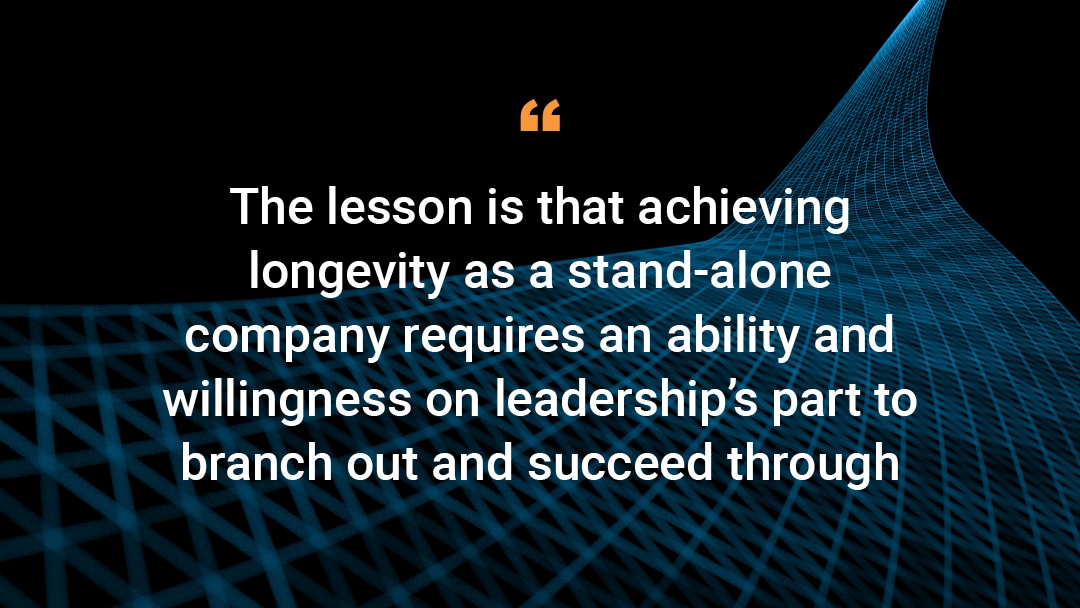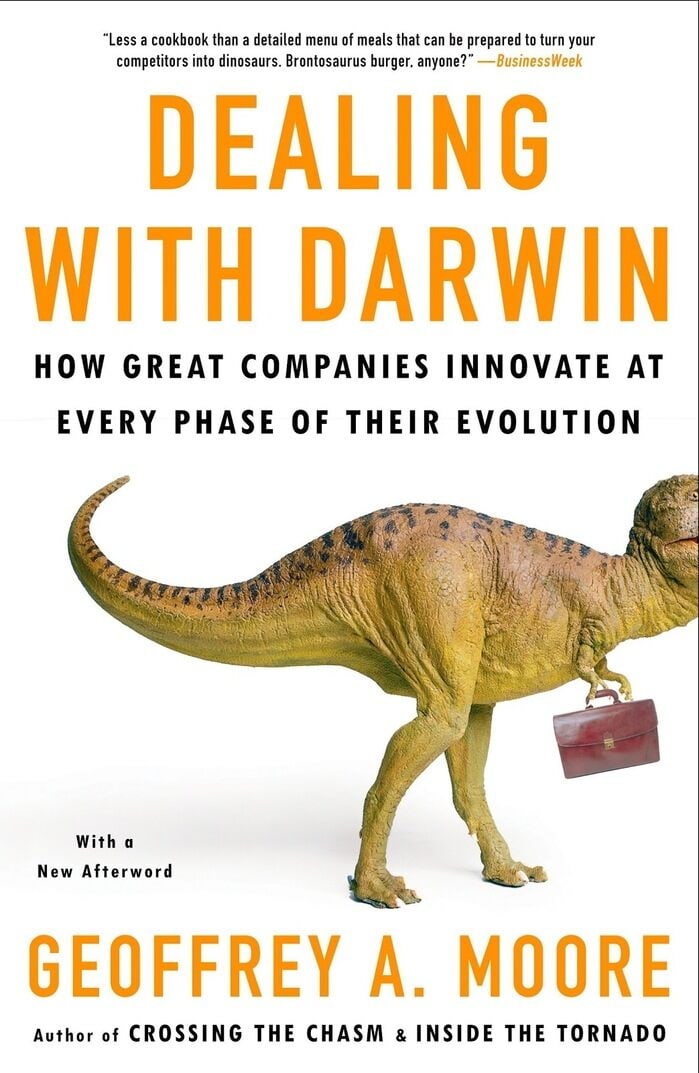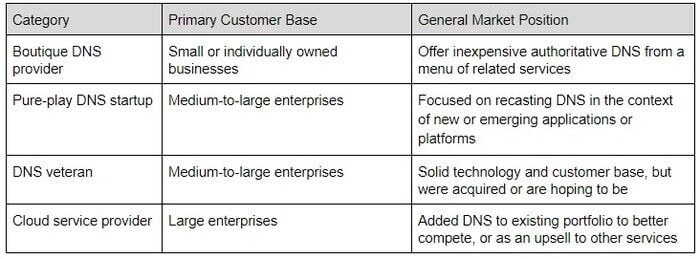Distinguishing Among DNS Services Part 3: Investment and Innovation

This is Part 3 of a three-part blog series highlighting some of the distinguishing aspects of Akamai's Domain Name System (DNS) services, Edge DNS and Global Traffic Management. Part 1 focused on Akamai's DNS platform and what sets it apart. Part 2 focused on the economics of authoritative DNS pricing models and how Akamai's approach is unique. In this final post in the series, we look at a less visible characteristic, which is how a DNS provider's ongoing investments and innovations might be used to distinguish one provider from another.
Technology marketing author Geoffrey A. Moore, best known for his iconic book "Crossing the Chasm," wrote a follow-on, "Dealing with Darwin: How Great Companies Innovate at Every Phase of Their Evolution," as a blueprint for those who had achieved market success with their initial product offers and now aimed to survive for the long haul. The central message is a strong one: Companies stuck in the inertia created from prior successes are at risk of ultimate failure unless they continue to take the requisite steps -- both small and large -- needed to stave off threats caused by commoditization, increased competition, external market forces, and even their own "tried and true" ways. As we'll explain, when it comes to mature companies like Akamai marketing mature products like DNS services, the themes and lessons found in "Dealing with Darwin" should be considered relevant for organizations evaluating DNS services and service providers.

As pointed out in Part 1 and Part 2 of this series, in recent years, the authoritative DNS marketplace has to an extent become commoditized, meaning price has become a prominent decision factor in selecting DNS providers. And while a few startups in the DNS space have attempted to differentiate, many vendors seem content to compete on price, or simply maintain status quo with their offers. It's also notable that some vendors who initially established their strong reputations in the DNS space were later acquired, never really advancing beyond their original business models. These are precisely the types of companies Moore was thinking about when he wrote "Dealing with Darwin." Again, the lesson is that achieving longevity as a standalone company requires an ability and willingness on leadership's part to branch out and succeed through innovation and investment in new market opportunities. As the cover of the book cleverly illustrates, those who don't invest and innovate risk extinction.

Unfortunately, it's ultimately customers of the ill-managed or under-resourced vendors who suffer the consequences. That's why a DNS evaluation (or any vendor evaluation, for that matter!) should take into consideration the prospective vendor's long-term track record, as well as its forward-looking prospects, as demonstrated by its ability and willingness to invest and innovate.
Today, the authoritative DNS vendor landscape can, for the most part, be summarized into four major categories, as shown in the table below.

The question is, in which of these categories is Akamai a clean fit? By these definitions, the correct answer would actually be "none" for the following reasons:
Boutique DNS provider? No, Akamai doesn't target small or individually owned businesses.
Pure-play DNS startup? No, Akamai is obviously not a startup, and its portfolio extends well beyond DNS.
DNS veteran? Sort of, except DNS isn't what Akamai is best known for. Besides, Akamai's authoritative DNS business is not the result of an acquisition, nor has it been spun off or acquired.
Cloud service provider? Yes, but a key difference between Akamai and others in that category is that DNS wasn't additive; it was integral to the original design of our global edge platform and still is.
So while Akamai as a DNS provider most closely aligns with the "DNS veteran" or "cloud service provider" categories, it offers clear differentiation in both. That was partially covered in the previous two parts of this series, which focused on our platform and pricing models, respectively. The third aspect, which we cover here, lies in Akamai's ongoing innovations and investments in DNS. Thinking about this in the context of Moore's work, Akamai's investments and innovations in DNS not only helped Akamai "cross the chasm," they have played an important role in Akamai's expansion, as well as its ability to diversify -- into DNS services, but more broadly into security, which is now the fastest-growing part of our business. Let's take a closer look.
Investment
Any discussion about Akamai's investment in DNS should begin with our platform, which provides not only the underpinnings for our content and service mapping functions, but our authoritative and recursive services on a global basis. And while other providers can claim significant investments in their platforms as well, none combine the longevity, global scale, and architectural uniqueness that characterize Akamai's. Even without the longevity (22 years and counting) and scale (close to 10,000 nameservers globally), the architecture used by Akamai's DNS, as well as the way it's deployed relative to our other services, is unique compared to those of other providers. That in and of itself represents a significant level of investment.
Akamai's long-term investment and approach to DNS extends to our growing portfolio of DNS and DNS-related products, which include our Edge DNS and Global Traffic Management authoritative services, but also to security offers such as Secure Internet Access and Secure Internet Access Services (SIA), which leverage more recent investments we've made in recursive DNS technology. And while other DNS providers offer both authoritative and recursive DNS services, Akamai alone has extended its recursive DNS investments to security services offered by carriers and internet service providers (ISPs), like the ones offered by Comcast Business and many others. Those services will take on even greater importance over time as the use of 5G and the Internet of Things (IoT) continues to increase. Akamai's recent acquisition of privately held Asavie is indicative of that growth and represents further investment, with Asavie's products now part of Akamai's SPS product line.
So, how are these distinguishing factors? In a couple of ways:
They point to a level of financial health and long-term vision. Customers want to know that their providers can and will continue to not only exist, but make continuous improvements to their services and portfolios over time. Akamai's profitability, as well as our willingness and ability to extend our DNS investments, sends a positive signal in this regard.
They create new ways for customers to leverage DNS to the benefit of their businesses. One example is an industry trend toward integrating DNS workflows across recursive and authoritative DNS, and domain management. End-to-end DNS offers potentially improved message privacy and integrity, so Akamai's investments in the end-to-end DNS ecosystem may bear fruit for customers looking to manage DNS that way.
Innovation
Of course, it's true that investment spurs innovation, and innovation manifests itself in a number of ways. While DNS protocols are both mature and highly standardized, they continue to evolve, technologically and otherwise. End-to-end DNS, as mentioned above, is one example.
Another is multi-provider DNS, an area for which Akamai recently contributed an innovation to the industry that promises to make the use of multiple DNS providers more efficient, as well as more secure, particularly with regard to managing CNAMEs at the zone apex. A new IETF standard called "Service binding and parameter specification via the DNS (DNS SVCB and HTTPS RRs)," which was co-authored by engineers from Akamai and Google, is designed to help customers optimize multi-provider DNS workflows. Our blog on that topic offers further detail, as well as other ways the service binding standard promises to benefit customers.
DevOps and DNS automation are additional areas of innovation focus for our DNS products. As we announced during our October 2020 Platform Update, we're raising the bar in this key area, which we believe will benefit customers by reducing OpEx through efficiency and simplification.
But innovation isn't limited to driving technological change. "Dealing with Darwin" describes how successful companies demonstrate a willingness and desire to do things differently, whether related to how products and services are supported, how they're priced, or how they're managed. Akamai's DNS roadmap for 2021 and beyond includes not only new features/functionality, but new ways for Akamai customers to interact with their services, reduce costs, and learn how to use them. And while we can't get into specifics here, we're always willing to meet with customers to discuss their needs and accept their feedback on how we might be able to improve our products to deliver more value to their businesses.
A final word
This blog series was written not to educate readers about DNS, but to point out possible ways for you to distinguish among DNS services and service providers in what is a crowded and diverse marketplace. Along the way, we've also been sure to show the ways that we believe Akamai stands out. In choosing a DNS service and a DNS provider, you have a wide range of options. Having more options is undoubtedly a good thing, but sifting through them can be cumbersome. Hopefully, we've offered up some key factors to consider that might make it easier.
It's true that every major DNS provider offers strengths that make it difficult for the others to compete. It's also true that some providers spend more time, effort, and money than others in promoting themselves and their offers. As a company that offers so many great products, Akamai doesn't always promote its DNS services with the gusto those services perhaps deserve. In that sense, this blog series has represented an opportunity to puff out our chests a little and explain what we believe are some of the advantages of trusting your DNS to Akamai. Relative to the vendor categories described earlier, as well as the factors previously covered in this series, we believe it's important for you to consider, in no particular order:
Whether or not a vendor is able to claim long-term profitability, which makes it possible to fund ongoing investments and innovations in DNS
If a vendor can describe not only the size of its platform but the uniqueness of that platform's architecture and how it informs the reliability of its service
A vendor's complete portfolio and how its DNS products complement that portfolio
What the future might hold for a vendor that is currently buzzworthy but more likely to be acquired than exist as a successful standalone company five years from now
Whether the vendor will be able to gracefully transition from an appliance/hardware-centric product approach to the cloud-centric approach that other vendors implemented from the start
How closely a vendor's track record of reliability actually aligns with how it's portrayed on its website
The cost of a vendor's DNS service, both in the near term and once traffic grows
These are some of the areas in which Akamai has been able to check all of the right boxes. And while other vendors might check some or most of them, or even offer up some others, we feel like this list captures most, if not all, of the factors that are most important in selecting a reliable and cost-effective DNS service for your digital business.
For your convenience, here are the previous entries in this series:
To learn more about Akamai's DNS or DNS-related products, you can visit their respective product pages:
Finally, if you're interested in taking Edge DNS, Global Traffic Management, or Secure Internet Access for a test drive, you are more than welcome to sign up for free trials of these products.



